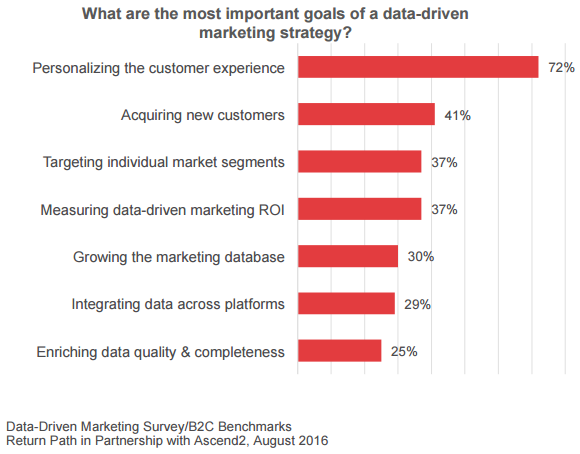When it comes to email content, we know that data is key to ensuring messages are relevant and engaging for those who are receiving them.
Return Path's new report in partnership with Ascend2: Strategies and Tactics for Data-Driven Marketing delves into the goals of B2C marketing influencers and how they are using data to improve their email strategies.
A great majority of email marketers are certainly using data to make email (and related) content more personal, but is enough value being placed on email personalization? And is simply making emails more personal effective enough?
Personalizing the customer experience is now the most important goal for many marketers
Return Path's latest research asks more than 200 B2C marketing influencers what they consider the most important goals are for their data-driven marketing strategies.
A massive 72% of those cite personalizing the customer experience as the most important, ahead of acquiring new customers (41%) and measuring ROI (37%).
But why is personalization so important?
Return Path's research points to two key reasons why personalization is proving so important to data-driven marketers.
Reason one is its fast-improving effectiveness, with 96% of those asked saying they are seeing personalization effectiveness increasing. Customers want content to be tailored to them and businesses are seeing such content have a positive impact.

Reason two comes from the report's finding that out of numerous data-driven marketing tactics, personalizing the customer experience is also one of the more straightforward techniques to implement.
Compared to making CX more personal, marketers are more likely to come across barriers with acquiring new customers, measuring ROI, integrating data across platforms and enriching data.
How are influencers using data to make email content personal? And are they focusing on the right areas?
In email marketing, using data to increasingly personalize content and messaging is being implemented via a range of tactics.
Making email messages personal is understandably a key technique, with 42% of marketing influencers considering it most effective. Additionally, using contact data to segment out email lists for targeting is of course well-used – with 35% of marketing influencers saying this is the most effective tactic.
But data-driven personalization is also important to consider for content beyond the email messages themselves. In fact, 45% of marketing influencers consider targeted landing pages to be the most effective data-driven marketing personalization tactic to be used and 38% say the same of web content personalization.
Certain tactics are often more difficult to implement than others, though. Web content personalization and lead intelligence collection are considered the hardest to use according to 41% and 45% of marketing influencers respectively.
On the flipside, targeted landing pages are far less likely to be considered challenging, with just 22% of marketing influencers saying they are most difficult to use. Additionally, just 26% cite email message personalization as the most difficult data-driven tactic to implement.
Using data to improve email personalization is certainly important
Consumers respond well to digital content that is shaped to fit them and it makes sense that such personalization is implemented as seamlessly as possible across channels and messages.
This latest research shows marketing influencers are increasingly reporting that their in-email personalization is getting more effective and there is a strong case that the tactic is one of the more straightforward ways to take quite simple data about customers and to use that to make emails more relevant and engaging for them.
But Return Path's report also does a good job at separating out data-driven tactics and where efforts to improve content personalization and targeting are worth being made beyond simply the emails themselves.
According to the marketers they surveyed, we can see that those looking to use data to improve content around the email journey should be looking to implement targeted landing pages if they are not doing so already. Additionally, using data to personalize on-site content is also a tactic which leans toward higher effectiveness and lower difficulty.
To sum up simply…
Emails may well be personal enough and marketers are right to use their data to make every effort to keep such messages as targeted and relevant as possible. But the wider journey in which email is inevitably a part of must be considered too, as there may well be even more effective personalization opportunities just one click away that are so far being overlooked.


No comments:
Post a Comment